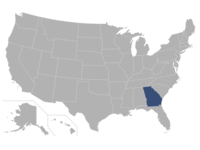New Georgia ‘Dirty Dozen’ update spotlights Clean Water Act’s power to rein in polluters

When pollution sullied Linda Smith’s childhood swimming hole on the Canoochee River more than two decades ago, she started documenting the damage with a bulky camcorder and educating herself about federal environmental protections.
At first, Smith said her family struggled to bring attention to the oozy algal blooms floating on the surface of the blackwater stream stretching across rural southeast Georgia.
“When we went to EPD to file a complaint, they said well you’re the only one complaining,” Smith said, referring to the state Environmental Protection Division.
But that all changed in 2000 when the Smith family filed a lawsuit under the federal Clean Water Act, which ultimately led to changes in how a local poultry processing plant discharged its waste and the creation of a nonprofit focused on protecting the river from pollution.
The Smith family’s successful legal challenge was one of a dozen legal actions highlighted in a new report celebrating the 50th anniversary of the passage of the Clean Water Act, which is now at the center of a years-long debate over which waterways should be covered by the federal law – including wetlands near the Okefenokee Swamp.
Smith participated in a virtual press conference Tuesday unveiling the Georgia Water Coalition’s annual Dirty Dozen report, which the group said this year is intended to outline landmark legal cases in Georgia that led to significant restoration of the state’s waterways since 1972.
“We have such a powerful tool in the Clean Water Act,” said Joe Cook with the Georgia River Network. “And we need to continue to protect that Clean Water Act and make sure that it’s there so that the citizens (and advocacy organizations) can continue to help citizens right wrongs.
“The power of the Clean Water Act lies with the citizens,” Cook said.
Chandra Brown, a former Ogeechee-Canoochee riverkeeper, called the Clean Water Act a “uniquely American law” with a provision that empowers property owners like Linda Smith to take polluters to court.
“This is literally what the Clean Water Act was designed to do,” Brown said. “To allow citizens to step in when the government fails to enforce the law.”
Other cases highlighted in the report include the U.S. Environmental Protection Agency’s rare use of its veto power under the law to stop a recreational reservoir in Bacon County because of the project’s threat to wildlife and a lawsuit that led to the city of Atlanta investing $2 billion in its sewer and drinking water infrastructure to clean up the Chattahoochee River, which was once derided as an “open sewer” downstream.
The report also outlined what advocates see as the biggest environmental threats in Georgia, including a proposed mining project near the Okefenokee Swamp.
Wetlands at the site lost federal protection under the Trump-era definition of a navigable waterway. Without federal oversight, state regulators will decide whether to sign off on an Alabama company’s plans to mine near the swamp.
“If the Clean Water Act can’t protect the Okefenokee Swamp, what can we protect?” said Rena Ann Peck, executive director of the Georgia River Network.
Two other top environmental concerns were flagged in the report: Georgia Power’s plans to leave toxic coal ash in unlined pits at a handful of power plants across the state, and unpermitted discharges from land application systems, which spray partially treated wastewater onto land.
“The progress that has been made since then in cleaning up Georgia’s water has been remarkable, but we still have a lot of work to do to make all the state’s water bodies swimmable and fishable,” Cook said.








